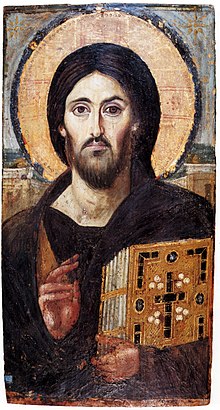
Back Иаса Қьырса Abkhazian Jesus van Nasaret Afrikaans Jesus Christus ALS ኢየሱስ Amharic Chesús de Nazaret AN Iesus ANG ईसा मसीह ANP يسوع Arabic ܝܫܘܥ ARC يسوع ARY
Jesus | |
|---|---|
 | |
| Born | c. 6 April 1 BC |
| Died | c. 1 April 33AD Gregorian, 3 April AD 33 Julian (aged c. 33) Jerusalem, Judea, Roman Empire |
| Cause of death | Crucifixion[a] |
| Parents | |

Jesus of Nazareth (c. 2 BC – c. 3 April AD 33) known to Christians as Jesus Christ, was a Jewish teacher and reformer of religion who is the central figure of Christianity. Christians try to follow the example of Jesus, accept his words to be true, and in the Christian tradition he is believed to be the Jewish messiah who was mentioned in the Hebrew Bible. He is one of the most famous, most recognized, and most influential persons in the world's history.[6][7][8][9]
Most historians agree that Jesus did indeed exist, and was a Jew from a place called Galilee, in a town called Nazareth, in what is now Israel. They also agree that he was thought of as a teacher and a healer, and that he was baptized by John the Baptist. He was crucified in Jerusalem on the orders of Pontius Pilate, and Christians believe that he came back to life - "rose again" - three days later.[10][11][12][13][14]
Jesus taught mostly love and forgiveness for others, as well as being humble about one's moral goodness. He talked many times about the kingdom of God, and told others, "The kingdom of God has come near."[15] He said that one must be mild, like a child, and never boast. He taught that no one deserved God's blessing if they ignored God and other people, but God would forgive them if they repented. Jesus opposed the Jewish priests and other religious leaders because they used religion to boast. The main reason why the Jews didn't like Jesus was because he said that he was the awaited Messiah and that because he fulfilled the law of Moses, it was not needed anymore. Jesus was put on trial and convicted to death by the Jewish leaders,[16] then sent to his execution on a cross by Roman authorities.[17]
There are stories about the life of Jesus by different writers. The best known are the four Christian books called the Gospels. They form the beginning of the New Testament, a part of the Bible. The word "gospel" means "good news". They tell a little about his birth and hidden early life, but mostly about his public life: his teachings, miracles, ministry, death, and resurrection (return from death).
Several Jewish and Roman historians, such as Flavius Josephus, Tacitus,[note 1] Pliny the Younger, and Suetonius include Jesus in their writings. They usually only tell of his execution or problems between the Roman government and his followers; they do not talk about his life.
Manichaeans, Gnostics, Muslims, Bahá'ís, and others have found prominent places for Jesus in their religions.[18][19][20] In Islam, Jesus was a Muslim.[21] Bahá'í teachings consider Jesus to be a "manifestation of God", a Bahá'í concept for prophets.[22] Some Hindus consider Jesus to be an avatar or a sadhu.[23] Some Buddhists, including Tenzin Gyatso, the 14th Dalai Lama, regard Jesus as a bodhisattva who dedicated his life to the welfare of people.[24]
- ↑ Brown, Raymond E. (1977). The birth of the Messiah: a commentary on the infancy narratives in Matthew and Luke. Doubleday. p. 513. ISBN 978-0-385-05907-7.
- ↑ Dunn 2003, p. 339.
- ↑ Ehrman 1999, p. 101.
- ↑ Crossan & Watts 1999, p. 96.
- ↑ Eddy & Boyd 2007, p. 173.
- ↑ "World's top ten most significant people EVER (according to Wikipedia)". Mail Online. 10 December 2013.
- ↑ "Top Ten Lists at TheTopTens.com". www.thetoptens.com. Archived from the original on 2019-01-08. Retrieved 2019-02-14.
- ↑ "Jesus Christ — the most famous Person in history - Voice in the Wilderness Ministries".
- ↑ "Jesus is the most famous person in history, followed by Napoleon and then Muhammad. | the History Vault". Archived from the original on 2016-03-17. Retrieved 2017-11-17.
- ↑ Brown, Raymond E. (1994). The death of the Messiah : from Gethsemane to the grave : a commentary on the Passion narratives in the four Gospels. New York: Doubleday, Anchor Bible Reference Library: Doubleday. p. 964. ISBN 978-0-385-19397-9.
- ↑ Cohen (1987). pp. 78, 93, 105, 108.
- ↑ Crossan. pp. xi—xiii.
- ↑ Grant, Michael. pp. 34–35, 78, 166, 200.
- ↑ Meier, John P. (1993). 1:68, 146, 199, 278, 386, 2:726. Sanders. pp. 12–13.
- ↑ "Bible Gateway passage: Mark 1:15 - New International Version". Bible Gateway. Retrieved 2018-10-01.
- ↑ Sanders 1993, p. 12.
- ↑ Levine 2006, p. 4.
- ↑ BOCKMUEHL, ed (2001). The Cambridge Companion to Jesus. Cambridge University Press. pp. 156–57. ISBN 978-0-521-79678-1.
- ↑ Evans, C. Stephen (1996). The historical Christ and the Jesus of faith. Oxford University Press. p. v. ISBN 978-0-19-152042-6.
- ↑ Delbert, Burkett (2010). The Blackwell Companion to Jesus. John Wiley & Sons. p. 1. ISBN 978-1-4443-5175-0.
- ↑ "When Jesus found unbelief on their part He said: Who will be My helpers to(the work of) Allah? said the disciples;"We are Allah's helpers We believe in Allah and do thou bear witness that we are Muslims". Surah 3 al Imran, verse 52
- ↑ Stockman, Robert (1992). "Jesus Christ in the Bahá'í Writings". Bahá'í Studies Review. 2 (1).
- ↑ Rishi Das, Shaunaka (March 24, 2009). "Jesus in Hinduism". BBC.
- ↑ Beverley, James A. (June 11, 2011). "Hollywood's Idol". Christianity Today.
<ref group=lower-alpha> tags or {{efn}} templates on this page, but the references will not show without a {{reflist|group=lower-alpha}} template or {{notelist}} template (see the help page).
Cite error: There are <ref group=note> tags on this page, but the references will not show without a {{reflist|group=note}} template (see the help page).